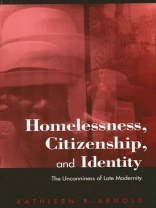In the aftermath of September 11, donations to the poor and homeless have declined while ordinances against begging and sleeping in public have increased. The increased security of public spaces has been matched by a quest for increased security and surveillance of immigrants. In this groundbreaking study, Kathleen R. Arnold explores homelessness in terms of the globalization of the economy, national identity, and citizenship. She argues that domestic homelessness and conditions of statelessness, such as refugees, exiles, and poor immigrants, are defined and addressed in similar ways by the political sphere, in such a manner that each of these groups are subjected to policies that perpetuate their exclusion. Drawing on such authors as Freud, Marx, Foucault, Derrida, Lévinas, and Agamben, Arnold argues for a radical politics of homelessness based on extending hospitality and the toleration of difference.
Innehållsförteckning
Acknowledgments
1. Introduction
2. Citizenship and Political Identity
Introduction
Citizenship and Property in the Liberal Tradition: Political Power and Economic Independence versus Dependence
Juridical Conceptions of Citizenship
Social Dimensions of Citizenship
Conclusion
3. Das Unheimliche
Introduction
Home/Homeless
Power Dynamics of Home/Homeless: The Uncanny
Political Manifestations of the Uncanny
4. Homelessness and Panopticism
Introduction
History and Background
Homelessness and Panopticism
Conclusion
5. Homeland, Homelessness, and Cosmopolitanism
Introduction
Self/Other
State Power, Identity, and the Nation-State
Capitalism and Globalization
Identity and Cosmopolitanism: A Politics of Homelessness
Cosmopolitan Citizenship
6. Debt, Guilt, and Responsibility: Schuld
Notes
Index
Om författaren
Kathleen R. Arnold is Assistant Professor of Political Science at The University of Texas at San Antonio.












